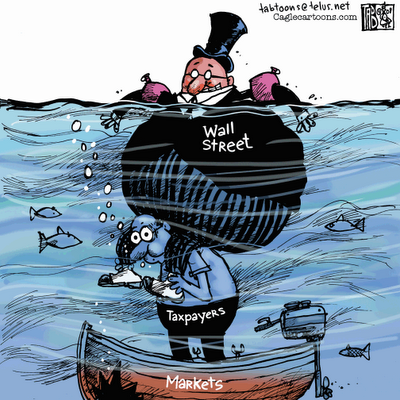 (July 2011) – Four years ago few policy-makers seemed to have the idea that the world was entering into years if not decades of a financial catastrophe. The same professionals have since been doing their best to assure us that a crunch and a crisis are things of the past. We have seen the bottom — they have informed us — and we are on our way up again.
(July 2011) – Four years ago few policy-makers seemed to have the idea that the world was entering into years if not decades of a financial catastrophe. The same professionals have since been doing their best to assure us that a crunch and a crisis are things of the past. We have seen the bottom — they have informed us — and we are on our way up again.
Their rosy outlook was fuelled by quantitative easing and the global bank bailouts by which the whole problem of economic derangement has been conveniently transferred to the taxpayers. Interest rates were cut to zero in order to stimulate business and middle-class renewed debt and consequent spending. It was a sweet-and-sour dish served up for the hungry at a time when no other food seems to be in sight, and now that recipe has failed as well.
How long can private and public debt keep piling up? Governments seem to have few thoughts in this area. They just want to raise debt ceilings. They seem hell-bent on doing their very best to help increase our individual and collective debt, perhaps hoping that one day all of us will go bust and debt will be wiped out. Or the other way around perhaps, all debt will go bust and we will all be wiped out. Whichever works best …
Economically speaking, every single taxpayer has a little pocket with a wallet in it. That small wallet represents the share that each and every one of us has in the greater economy. All our little wallets together make this gigantic wallet, the enormous big public saving and spending account.
This collective welfare account is what governments now have allowed financial institutions free access to by means of printing money backed by things we all have got in our little pockets. Things like our houses, our neighbourhood, the schools our children go to, the hospital, the airport … everything we have got really.
Terms like “too big to fail” combined with terms like “public option” infer economic policies that push everything to the limit and bailout those at the greatest point of perceived necessity. Standard policy is to protect the interests of the wealthy class and somehow stave off the poor, thereby reducing chances of uprising.
The policy-makers may think they are acting smart. They may still have a poor understanding of the effects of overburdening the middle classes with debt. With sufficient momentum this avalanche will force still newer forms of major political and economic corrections that in the minds of most rational people will need to be met with a new order.
